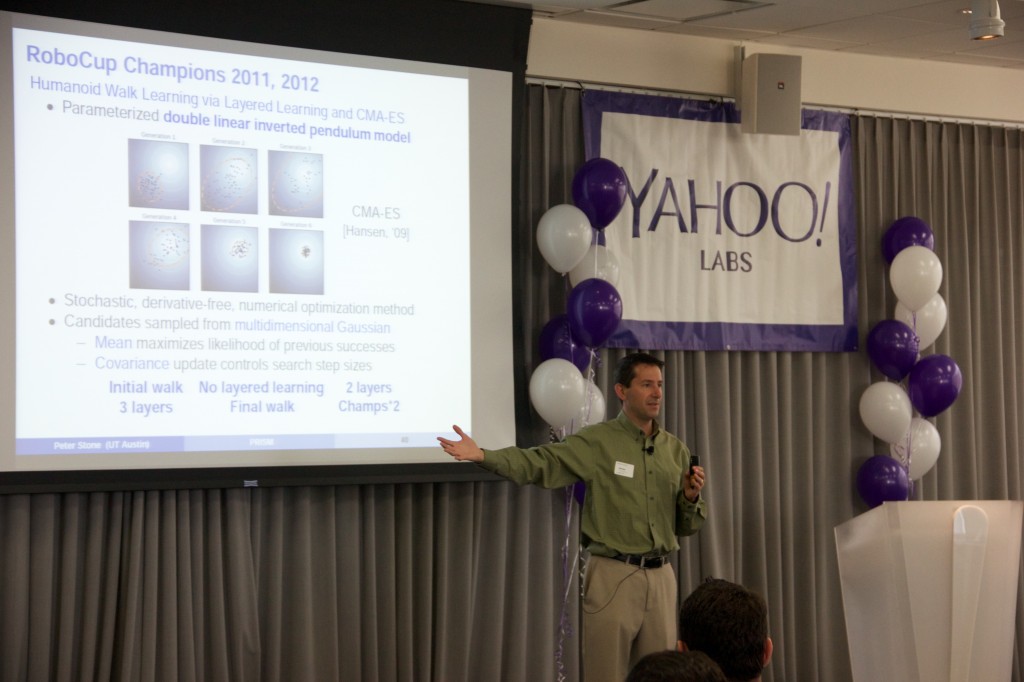 Last week we were honored to have hosted Dr. Peter Stone of The University of Texas at Austin for an enlightening Big Thinkers seminar on "Learning and Multiagent Reasoning for Autonomous Robots." Founder and Director of the Learning Agents Research Group (LARG) within the Artificial Intelligence Laboratory in the Department of Computer Science at UT Austin, Dr. Stone discussed everything from a brief history of computing to the path to fully autonomous robots.
Last week we were honored to have hosted Dr. Peter Stone of The University of Texas at Austin for an enlightening Big Thinkers seminar on "Learning and Multiagent Reasoning for Autonomous Robots." Founder and Director of the Learning Agents Research Group (LARG) within the Artificial Intelligence Laboratory in the Department of Computer Science at UT Austin, Dr. Stone discussed everything from a brief history of computing to the path to fully autonomous robots.
Dr. Stone talked about his research efforts to realize his long-term goal of "robust, fully autonomous agents in the real world." In other words, a future where robotics is ubiquitous. To illustrate his research process and display the progress made, Professor Stone spent time demonstrating his robot soccer project, RoboCup Soccer, where the goal is to have a team of "humanoid robots that can beat the human World Cup champion team" by the year 2050.

Much of the progress in the RoboCup Soccer game is attributable to the evolution of Dr. Stone's hierarchical machine learning method known as "layered learning," which he discussed at length. The event was broadcast live on our labs.yahoo.com homepage and viewers had the opportunity to ask questions and comment on our Twitter stream @YahooLabs as well as our Facebook page.
If you would like to learn about layered learning and see what the future of robotics looks like, watch the full seminar here:
ABSTRACT
Over the past half-century, we have transitioned from a world with just a handful of mainframe computers owned by large corporations, to a world in which private individuals have multiple computers in their homes, in their cars, in their pockets, and even on their bodies. This transition was enabled by computer science research in multiple areas such as systems, networking, programming languages, human-computer interaction, and artificial intelligence.
We are now in the midst of a similar transition in the area of robotics. Today, most robots are still found in controlled, industrial settings. However, robots are starting to emerge in the consumer market, and we are rapidly transitioning towards a time when private individuals will have useful robots in their homes, cars, and workplaces.
For robots to operate robustly in such dynamic, uncertain environments, we are still in need of multidisciplinary research advances in many areas such as computer vision, tactile sensing, compliant motion, manipulation, locomotion, high-level decision-making, and many others. This talk will focus on two essential capabilities for robust autonomous intelligent robots, namely online learning from experience, and the ability to interact with other robots and with people. Examples of theoretically grounded research in these areas will be highlighted, as well as concrete applications in domains including robot soccer and autonomous driving.
BIOGRAPHICAL NOTE
Dr. Peter Stone is the founder and director of the Learning Agents Research Group (LARG) within the
Artificial Intelligence Laboratory in the
Department of Computer Science at
The University of Texas at Austin. Dr. Stone's main research interest in AI is understanding how we can best create complete intelligent agents. He considers adaptation, interaction, and embodiment to be essential capabilities of such agents. Thus, his research focuses mainly on machine learning, multiagent systems, and robotics. To Dr. Stone, the most exciting research topics are those inspired by challenging real-world problems. He believes that complete successful research includes both precise, novel algorithms and fully implemented and rigorously evaluated applications. His application domains have included robot soccer, autonomous bidding agents, autonomous vehicles, autonomic computing, and social agents.
Yahoo Labs is proud to bring you its 2015 Big Thinkers Speaker Series. Each year, some of the most influential, accomplished experts from the research community visit our campus to share their insights on topics that are significant to Yahoo. These distinctive speakers are shaping the future of the new sciences underlying the Web and are guaranteed to inform, enlighten, and inspire.
 Last week we were honored to have hosted Dr. Peter Stone of The University of Texas at Austin for an enlightening Big Thinkers seminar on "Learning and Multiagent Reasoning for Autonomous Robots." Founder and Director of the Learning Agents Research Group (LARG) within the Artificial Intelligence Laboratory in the Department of Computer Science at UT Austin, Dr. Stone discussed everything from a brief history of computing to the path to fully autonomous robots.
Last week we were honored to have hosted Dr. Peter Stone of The University of Texas at Austin for an enlightening Big Thinkers seminar on "Learning and Multiagent Reasoning for Autonomous Robots." Founder and Director of the Learning Agents Research Group (LARG) within the Artificial Intelligence Laboratory in the Department of Computer Science at UT Austin, Dr. Stone discussed everything from a brief history of computing to the path to fully autonomous robots.